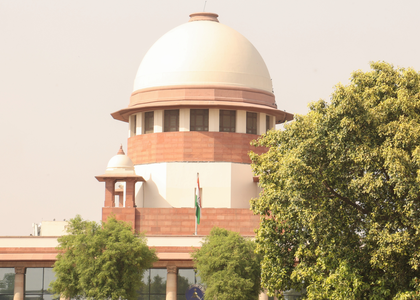Adverse possession plea can’t be raised at appeal stage: SC
By IANS | Updated: August 12, 2025 11:54 IST2025-08-12T11:47:38+5:302025-08-12T11:54:58+5:30
New Delhi, Aug 12 The Supreme Court has upheld a Jharkhand High Court decision that had set aside ...

Adverse possession plea can’t be raised at appeal stage: SC
New Delhi, Aug 12 The Supreme Court has upheld a Jharkhand High Court decision that had set aside a first appellate court’s decision granting ownership rights on the basis of adverse possession in a civil suit.
A Bench of Justices J.B. Pardiwala and R. Mahadevan concurred with the Jharkhand High Court’s view that the first appellate court had acted beyond the pleadings in introducing and deciding an adverse possession claim not originally pleaded in the suit.
The Justice Pardiwala-led Bench said, “It is a settled position of law that the foundation for the plea of adverse possession must be laid in the pleadings and then an issue must be framed and tried. A plea not properly raised in the pleadings or issues at the stage of trial would not be permitted to be raised for the first time at the stage of first appeal under Section 96 of the Code of Civil Procedure (CPC).”
The civil dispute arose from a title suit filed in 1999, seeking cancellation of a 1997 sale deed executed in favour of the defendants, terming it “bogus” and “inoperative”, along with a prayer for possession and permanent injunction.
The trial court dismissed the suit in August 2018, finding no fraud or misrepresentation in the execution of the sale deed. On appeal, the Deoghar District Judge decreed the suit in the plaintiffs’ favour in respect of a certain property, holding that they had perfected title through adverse possession as the defendants had not reclaimed possession since 2000.
The defendants challenged this before the Jharkhand High Court, which held that there was no foundational pleading of adverse possession and that such a claim cannot mature during the pendency of a suit.
“There is no concept of perfection of title by adverse possession during the pendency of the suit between the parties. [A]dverse possession cannot be decreed on a title which is not pleaded,” observed the Jharkhand HC.
Expressing its agreement, the Supreme Court said that a plea of adverse possession is fact-specific and must be expressly raised in the plaint.
“It is important to remember that the basic rule of law of pleadings is, that a party can only succeed according to what he has alleged and proved, otherwise, on the principle of secundum allegata et probata, a party is not allowed to succeed, where he has not set up the case which he wants to substantiate,” observed the Justice Pardiwala-led Bench.
It further underlined the principle that “the decision of a case cannot be based on grounds outside the pleadings of the parties and it is a case pleaded that has to be found”.
The apex court, affirming both the trial court’s and the Jharkhand High Court’s decision, held: “Unless the plea of adverse possession has been specifically raised in the pleadings, put in issue, and then cogent and convincing evidence led… the plea of adverse possession cannot be allowed to be flung as a surprise on an unsuspecting defendant, for the first time in appeal.”
Disclaimer: This post has been auto-published from an agency feed without any modifications to the text and has not been reviewed by an editor
Open in app